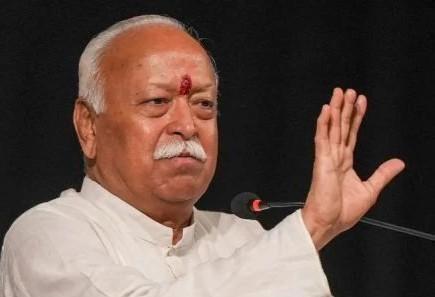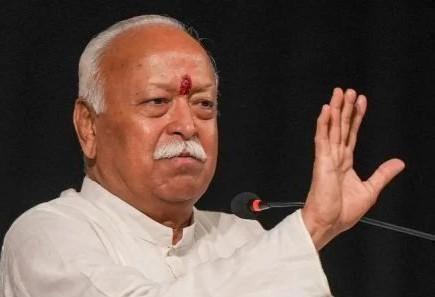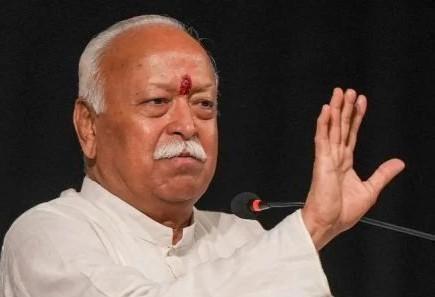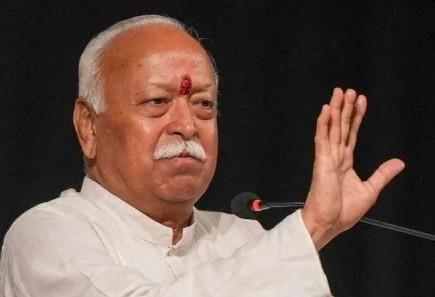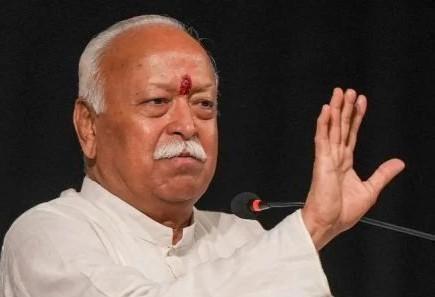
Title: If someone turns to evil then we’ll teach lesson: Bhagwat on J&K attack
In the wake of the recent terror attack in Pahalgam, Jammu and Kashmir, RSS chief Mohan Bhagwat has made some striking statements that have sparked a debate in the country. While expressing his condolences to the families of the victims, Bhagwat also emphasized that non-violence is indeed India’s religion, but so is teaching a lesson to “oppressors and hooligans”.
The statement comes at a time when the country is still reeling from the aftermath of the attack that left several people dead and many more injured. The attack, which was carried out by terrorists, has sparked widespread outrage and condemnation across the country.
Bhagwat’s statement has been widely reported and has sparked a debate on whether the RSS chief’s words were meant to incite violence or if he was simply stating a fact. In an interview, Bhagwat said, “We never harm or disrespect our neighbours, but if someone is bent on being evil, what is the cure? The king’s duty is to protect the people, and he will do his duty.”
While some have interpreted Bhagwat’s statement as a call to arms, others have seen it as a reminder of the government’s responsibility to protect its citizens. In a country where terrorism and extremism are growing concerns, Bhagwat’s statement has sparked a debate on the delicate balance between national security and human rights.
One of the key issues at stake is the question of whether the government should prioritize national security over human rights. In recent years, the government has faced criticism for its handling of issues related to national security, particularly in the context of the Kashmir conflict.
The conflict has led to the deaths of hundreds of people, including civilians, security personnel, and terrorists. The government has faced criticism for its handling of the conflict, with many accusing it of using excessive force against civilians.
In the context of Bhagwat’s statement, it’s worth noting that the RSS has a long history of promoting Hindu nationalism and has been accused of fomenting violence against minority communities. However, it’s also worth noting that the RSS has denied any involvement in the recent attack and has condemned the violence.
Despite the controversy surrounding Bhagwat’s statement, many have seen it as a call to action. In an era where terrorism and extremism are growing concerns, Bhagwat’s statement has sparked a debate on the need for the government to take a firmer stance against terrorism.
The debate has also raised questions about the role of the government in protecting its citizens. In a country where terrorism is a growing concern, Bhagwat’s statement has sparked a debate on whether the government has a duty to protect its citizens from harm.
In conclusion, Bhagwat’s statement has sparked a debate on the delicate balance between national security and human rights. While some have interpreted his statement as a call to arms, others have seen it as a reminder of the government’s responsibility to protect its citizens.
It’s worth noting that Bhagwat’s statement has been widely reported and has sparked a national debate on the issue of terrorism and national security. While the debate is ongoing, one thing is clear – the country needs a comprehensive approach to combating terrorism and extremism.
It’s also worth noting that the government has a duty to protect its citizens and to ensure that they are safe from harm. In an era where terrorism is a growing concern, Bhagwat’s statement has sparked a debate on the need for the government to take a firmer stance against terrorism.
In the end, it’s up to the government to decide how to balance national security with human rights. However, one thing is clear – the country needs a comprehensive approach to combating terrorism and extremism.
Source: https://youtu.be/SpAKVWl5wII
